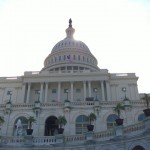True to our fears, the Trump administration is already inflicting whiplash on everyday Americans, as many of us flit from report to report in an effort to ascertain exactly what the new President is doing. Perhaps the most glaring example of this from the first several weeks of the new administration has been the travel ban, which bars entry into the US for any person coming from a number of majority-Muslim countries.
This post will not discuss the specifics of the ban at length. Far more able commentators have already done an exquisite job of this here and here. Though not currently at the front of the headlines, suffice to say that the order offers up several legal problems for the Trump presidency in the coming weeks and months, an issue that will persist despite the linguistic gymnastics of Trump’s big four. Although there will certainly be revisions in future orders, the ban remains a harsh and paradoxical piece of legislation for a man who was borne by one immigrant and married to two others.
Still, it seems the more pressing issue than the political dilemma the ban proposes is the moral one, especially for religious individuals who take the Syrian refugee crisis seriously. While the US has already put forth a comparatively poor effort in providing shelter to refugees, the notion of completely excluding them presents a conundrum for citizens whose day-to-day choices are informed by their theology. Indeed, the idea that we ought to deny every immigrant save for those who share our cultural traits or possess specialized skills is incongruent with the values propagated in various holy texts. This is especially true of my own Christian faith, which calls on me to do good even when it makes me vulnerable in doing so.
A pastor friend once put this idea into perspective for me. One afternoon he asked me, “What does the Bible say true religion is?” I paused, embarrassed, wishing I had paid better attention in Sunday school. Sheepishly I replied “Uh, worship God.” He smiled. I was wrong, but predictably so. “To care for widows and orphans in their affliction” he countered.
On my view, this verse is more than a trivia tidbit or a poignant line in a sermon; rather, it is a reminder of the praxis my beliefs call me to. As people of faith, our vocation is not to calculate who among the widowed and orphaned are most in need, or which are most able to contribute to America’s workforce, but to care for them. Full stop. Regardless of a suffering person’s customs or creed, principled religious devotees know better than to qualify who is actually deserving of help.
St. Augustine of Hippo understood this sentiment well. In his commentary on the Sermon on the Mount, Augustine describes the difficult life Christianity conscripts human beings into, asking his readers to fully consider the unsettling fact that their religion summons them to love their enemies and abandon their families.[1] The point is as salient today as it was sixteen centuries ago: to live by conviction is to live a strange and in some ways dangerous existence. To not live lavishly or powerfully, but boldly, and often in ways that contradict self-interest. Characters that lived this way are rife within the major religious traditions, and their stories are often admirable whether or not they hail from your belief system. John the Baptist comes to mind. So does Elijah. In any case, Augustine’s words ring as true today as they did then, and people of faith would do well to shoulder part of the burden of caring for those who desire to live here.
I’m not claiming we should throw caution to the wind when it comes to national security. Lord knows I would fail this test, and telling a community to abandon their family’s safety won’t exactly show up on campaign bumper stickers anytime soon. After all, Augustine is also an early theorist of the just war tradition, and it isn’t categorically wrong to determine if there are limits to who should and should not be admitted into a nation. But it seems to me there is something fundamentally craven in forcing the afflicted from our midst for fear that violence lies in wait. Because in the end, that’s exactly what the travel ban is all about: fear of and suspicion towards those different from us. And last I checked my Bible told me to not fear the dangers of this world.
[1] On the Sermon on the Mount, 1.15.40
 Jacob Marthaller is a freelance writer and government contracting associate living in the Washington, DC area. He holds a Master’s degree in Religious Ethics from the University of Virginia, where he studied at the confluence of theology and politics. In his free time, he likes to read, write, and volunteer for environmental causes.
Jacob Marthaller is a freelance writer and government contracting associate living in the Washington, DC area. He holds a Master’s degree in Religious Ethics from the University of Virginia, where he studied at the confluence of theology and politics. In his free time, he likes to read, write, and volunteer for environmental causes.












